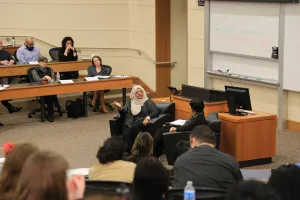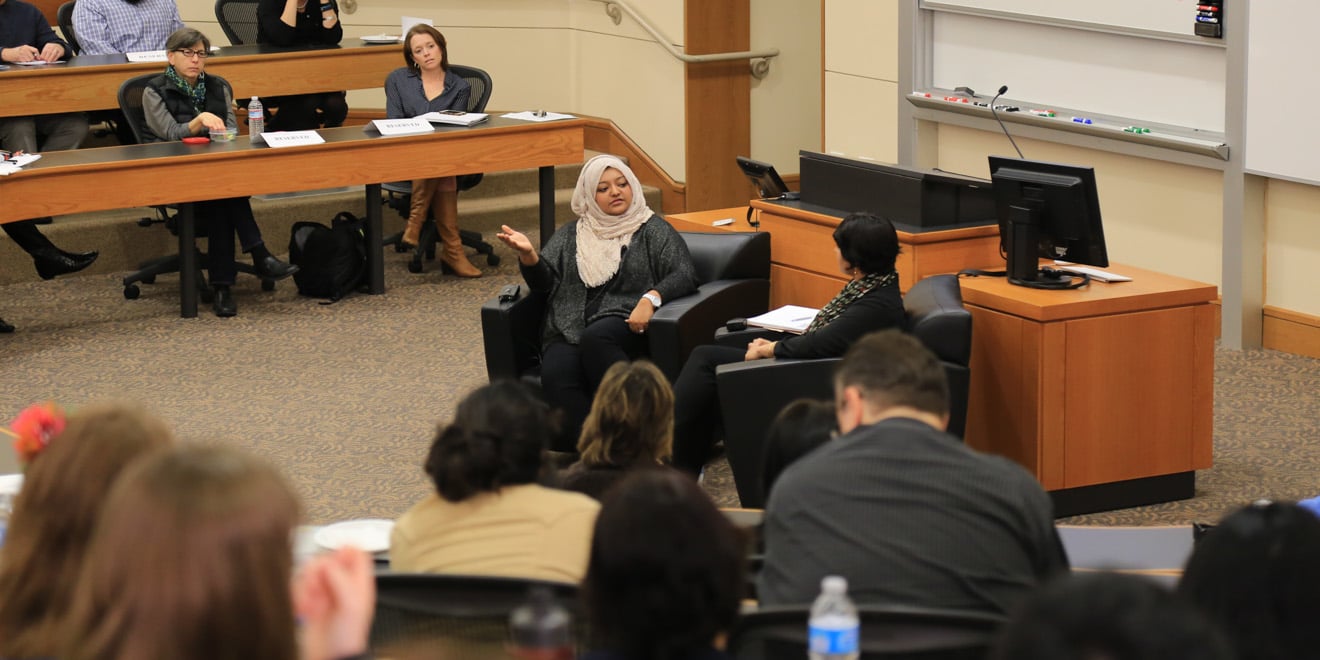On Monday afternoon, Rabia Chaudry, the family friend and past lawyer who brought the case of Adnan Syed to “Serial” host Sarah Koenig, came to Stanford Law School to give her first public talk about her experience with the podcast. Umbreen Bhatti, a lawyer and 2014 John S. Knight Journalism Fellow, facilitated the discussion, “Let’s Give Them Something To Talk About: What Serial Can Teach Us About Advocacy.”

From October to December, “Serial,” a weekly podcast from the creators of “This American Life,” kept listeners on the edge with the story of Adnan Syed and the murder of his ex-girlfriend, Hae Min Lee, in 1999. Convicted of strangling Lee, Syed was sentenced to life in prison but has maintained his innocence for 15 years.
According to Chaudry, she brought the case to the media’s attention not for show but in the hopes of finding new evidence in the case to support Syed. In fact, she first contacted Koenig without asking Syed beforehand.
“I was looking for a smoking gun – something that would help exonerate Adnan,” Chaudry said.
Chaudry explained that she and Syed’s family first realized how much Koenig could help them when the journalist was able to speak to Asia McClain, a witness who was never contacted for the trial but claimed to have seen Syed in the library at the time of Lee’s murder.
“When that happened, for me and Adnan and his family, we realized the value of Sarah,” Chaudry said.
However, Chaudry also explained that the relationship between Koenig and Syed and his family and friends was complicated. Since Koenig was telling Syed’s story from a journalist’s point of view, Syed and his friends and family always felt they needed to consider how their words might be construed. They also did not have a say in what material would be aired in the podcasts.
One aspect of “Serial” which most dissatisfied Chaudry was Koenig’s portrayal of Syed’s lawyer, Christina Gutierrez.
“I was livid because I thought Sarah was really easy on Gutierrez,” Chaudry said.
Although Gutierrez was dealing with multiple sclerosis at the time of the case, Chaudry said the lawyer’s “ineffective assistance” and “crooked” practices could not be blamed on sickness. Gutierrez often would not answer the family’s questions and was also suspected of misconduct in handling money with several of her clients.
According to Chaudry, the audio clip of Syed talking about his relationship with Gutierrez was only a partial conversation. Koenig failed to include the fact that Syed was speaking about his 17-year-old opinion of Gutierrez and that he had not known how Gutierrez was treating his family.
Chaudry also believed that Koenig did not really understand the bias issues that shaped the way the state framed Syed’s motives for murdering Lee. According to Chaudry, she had to explain to Koenig the incorrect stereotypes included in the research about the Muslim community presented during Syed’s prosecution.
Throughout the airing of “Serial,” Chaudry kept her own blog in response to the podcasts and said that what she initially wrote would sometimes upset Koenig.
“Sarah’s telling a story, but I want to tell Adnan’s story,” Chaudry said. “I wasn’t following her rules.”
Chaudry later agreed to honor Koenig’s conditions of privacy for certain sources and avoided writing about material that would be revealed in future podcasts. However, like the rest of the nation, Chaudry would have to wait until Thursday every week to find out what each episode would include.
“My agenda is different from [Koenig’s] agenda,” Chaudry said. “My agenda is to get him out of jail.”
“I believe Adnan is innocent because I know Adnan,” Chaudry added. “And the case against him is weak.”
Chaudry also spoke about content excluded from the “Serial” podcasts, including a letter Syed wrote to Koenig about his feelings for Lee.
While many of the listeners who believed Syed was guilty asked why he never explicitly said that he did not kill Lee, according to Chaudry, Syed wrote a letter to Koenig that never appeared in the podcasts. The letter stated that Syed would never have murdered Lee, but Koenig would not include the letter in the podcasts.
In terms of the future of Syed’s case, Chaudry explained that they have filed for a post-conviction appeal based on the Asia McClain plea, and the court is required to respond by Jan. 14. Physical evidence is also undergoing testing, and court findings will be coming out in the next couple of weeks.
“We are light-years away from where we were years ago,” Chaudry said. “We have hope now.”
After the discussion, Bhatti explained that the event had been very successful with 500 RSVPs and an entirely full overflow room for those who could not fit into the 200-person law school classroom. The event was hosted by the Stanford Center on the Legal Profession, Stanford Criminal Justice Center and the John S. Knight Journalism Fellowship at Stanford, and according to Lucy Ricca, executive director of the Center on the Legal Profession, somewhere between 325 and 350 people attended.
“I was thrilled to have a chance to think about the larger issues with Rabia of how we take cases forward in the news – what does it mean as lawyers for us to advocate for our clients using every possible means,” Bhatti said.
Chaudry was also happy with the outcome and explained that it helped her understand what audiences want to learn from her.
“It’s my first public appearance to talk about this, but it’s the first of many,” Chaudry said. “It’s good because I know what people are thinking and what they’re interested in talking about.”
“I think “Serial” is a phenomena that nobody could have predicted, and I would do it again over and over and over,” Chaudry added. “I’m ever grateful. It has opened doors we did not have open to us a year ago.”
Contact Kylie Jue at kyliej ‘at’ stanford.edu.
